Plot
The series is based on the life of Nurhaci, the founder of the Qing dynasty. Nurhaci started his life of a warrior-king by uniting the Jurchen (later Manchu) tribes under his rule. In addition to suppressing the threat of internal conflict, Nurhaci attacks the Ming Empire's territories in northern China. Nurhaci helped to build a strong foundation for his son and successor, Huangtaiji, who eventually conquers the Ming Empire and establishes the Qing Empire.
He also is entangled between five women in his life, and this is highlighted in the series. The five women are Menggu, Naqiya, Dongge, Abahai, and Tunggiya Qingya. Dongge is a renowned beauty from the plains and loves both Nurhaci and his brother Surhaci. Tunggiya Qingya is Nurhaci's primary consort and the mother of Cuyen and Daisan. Menggu is the mother of Hong Taiji and a beautiful woman with a mysterious past. Abahai was his favorite during his later years and the mother of Dodo, Dorgon, and Ajige. Naqiya was the former wife of Li Rubai, but Nurhaci later wed Naqiya to Surhaci.

Hong Taiji, also rendered as Huang Taiji and sometimes referred to as Abahai in Western literature, also known by his temple name as the Emperor Taizong of Qing, was the second khan of the Later Jin dynasty and the founding emperor of the Qing dynasty. He was responsible for consolidating the empire that his father Nurhaci had founded and laid the groundwork for the conquest of the Ming dynasty, although he died before this was accomplished. He was also responsible for changing the name of the Jurchen ethnicity to "Manchu" in 1635, and changing the name of his dynasty from "Great Jin" to "Great Qing" in 1636. The Qing dynasty lasted until 1912.
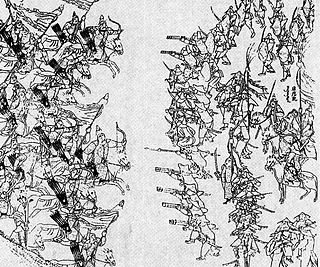
The Battle of Sarhū refers to a series of battles between the Later Jin dynasty and the Ming dynasty and their Joseon allies in the winter of 1619. The battle is notable for the heavy use of cavalry by the Later Jin in defeating Ming and Joseon forces equipped with hand cannons, cannons, and matchlocks.
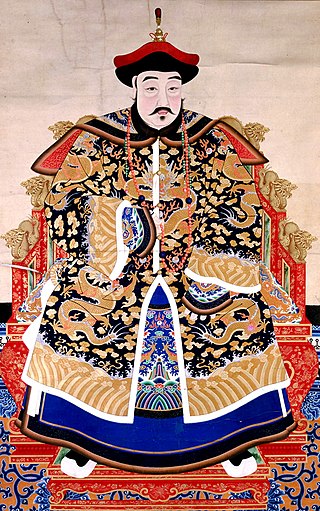
Dodo, formally known as Prince Yu, was a Manchu prince and military general of the early Qing dynasty.
The Jianzhou Jurchens were one of the three major groups of Jurchens as identified by the Ming dynasty. Although the geographic location of the Jianzhou Jurchens changed throughout history, during the 14th century they were located south of the Wild Jurchens and the Haixi Jurchens, and inhabited modern-day Liaoning and Jilin provinces in China. The Jianzhou Jurchens were known to possess an abundant supply of natural resources. They also possessed industrial secrets, particularly in processing ginseng and the dyeing of cloth. They were powerful due to their proximity to Ming trading towns such as Fushun, Kaiyuan, and Tieling in Liaodong, and to Manpojin camp near Korea.
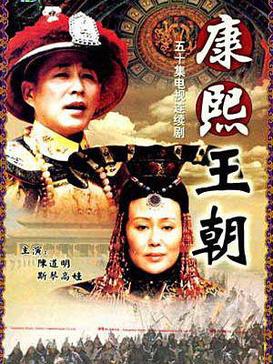
Kangxi Dynasty is a 2001 Chinese television series based on the novel Kangxi Da Di by Eryue He. The series is a prequel to the 1997 television series Yongzheng Dynasty, and was followed by Qianlong Dynasty in 2002.

Empress Xiaoliewu, of the Manchu Plain White Banner Ula Nara clan, personal name Abahai, was a consort of Nurhaci. She was 31 years his junior.
The Old History of the Five Dynasties was an official history mainly focus on Five Dynasties era (907–960), which controlled much of northern China. And it also includes some history of other south states during the era. It was compiled by the Song dynasty official-scholar Xue Juzheng in the first two decades of the Song dynasty, which was founded in 960. It is one of the Twenty-Four Histories recognized through Chinese history.

Nara is a clan name shared by a number of royal Manchu clans. The four tribes of the Hūlun confederation (扈倫四部) – Hada, Ula, Hoifa and Yehe – were all ruled by clans bearing this name.
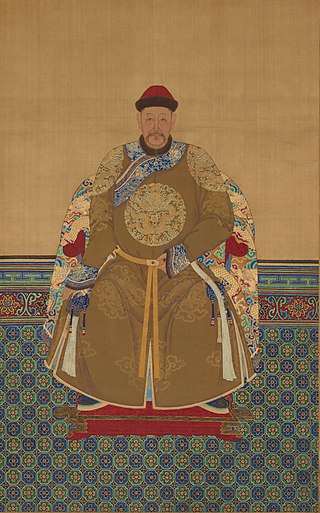
Daišan was an influential Manchu prince and statesman of the Qing dynasty.

Cuyen was a Manchu prince and eldest son of the Later Jin ruler Nurhaci, the early patriarch of the Qing dynasty. An accomplished warrior, Cuyen was instrumental in the consolidation of Nurhaci's authority among rival Jurchen clans. He also served as the primary civil administrator for intermittent periods in the regime founded by Nurhaci. However, he eventually lost favour with his father because he tried to cast sorcery spells against other princes. He was placed in solitary confinement and died in captivity a few years later.
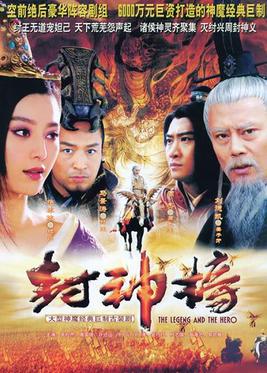
The Legend and the Hero is a 2007 Chinese television series adapted from the 16th-century novel Fengshen Yanyi written by Xu Zhonglin and Lu Xixing. The first season started airing on CCTV-8 in February 2007. It was followed by a sequel, The Legend and the Hero 2 in 2009.
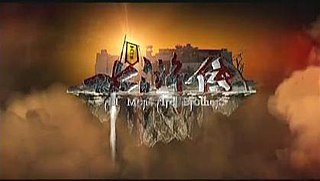
All Men Are Brothers is a 2011 Chinese television series adapted from Shi Nai'an's 14th century novel Water Margin, one of the Four Great Classical Novels of Chinese literature. The series is directed by Kuk Kwok-leung and features cast members from mainland China, Taiwan and Hong Kong. The series was first broadcast on 8TV in March 2011 in Malaysia.

Xiaozhuang Mishi, also known as Xiaozhuang Epic, is a 2003 Chinese television series produced by You Xiaogang. The series is the first installment in a series of four television series about the early Qing dynasty. It was followed by Huang Taizi Mishi (2004), Taizu Mishi (2005) and Secret History of Kangxi (2006), all of which were also produced by You Xiaogang.

Huang Taizi Mishi is a 2004 Chinese television series produced by You Xiaogang. The series is the second instalment in a series of four television series about the history of the early Qing dynasty. It was preceded by Xiaozhuang Mishi (2003), and followed by Taizu Mishi (2005) and Secret History of Kangxi (2006), all of which were also produced by You Xiaogang.

Secret History of Kangxi is a 2006 Chinese television series produced by You Xiaogang. The series is the fourth instalment in a series of four television series about the history of the early Qing dynasty. It was preceded by Xiaozhuang Mishi (2003), Huang Taizi Mishi (2004) and Taizu Mishi (2005), all of which were also produced by You Xiaogang. The series was renamed to Nalan and Kangxi for release in Hong Kong on ATV.

The Affaire in the Swing Age, also known as The Dynasty or Love Against Kingship, is a 2003 Chinese television series based on the novel Jiangshan Fengyu Qing by Zhu Sujin, who was also the screenwriter for the series. The series depicts the events in the transition of the Ming dynasty to the Qing dynasty in China, focusing on the lives of historical figures such as Li Zicheng, Wu Sangui, Chen Yuanyuan, the Chongzhen Emperor and Huangtaiji.
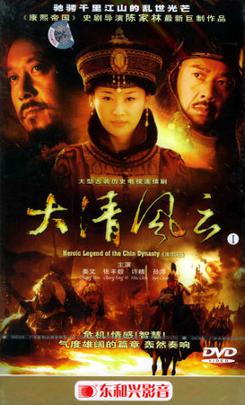
Da Qing Fengyun, alternatively known as Qing Gong Fengyun, is a 2006 Chinese television series directed by Chen Jialin, starring Zhang Fengyi, Xu Qing and Jiang Wen. Set in the early Qing dynasty, the story focuses on the romance between Dorgon and Empress Dowager Xiaozhuang.

Nurhaci, also known by his temple name as the Emperor Taizu of Qing, was a Jurchen chieftain who rose to prominence in the late 16th century in Manchuria. A member of the House of Aisin-Gioro, he reigned as the founding khan of the Later Jin dynasty of China from 1616 to 1626.
Rule the World is a 2017 Chinese television series based on the novel Du Bu Tian Xia by Li Xin. It stars Raymond Lam and Tang Yixin alongside Zhang Rui, Jing Gangshan, Li Zhinan and Qu Chuxiao. The series started airing on Tencent Video from 30 November 2017 at 20:00 (CST).

The Great Emperor in Song Dynasty is a 2015 Chinese historical TV series directed by Gao Xixi, starring Chen Jianbin as Emperor Taizu of Song who founded the Song dynasty and reunified most of China proper.

















